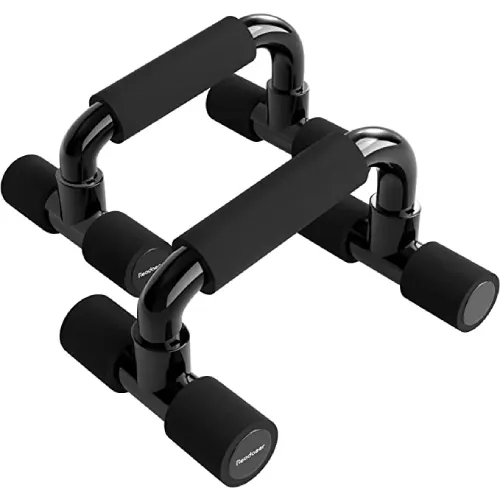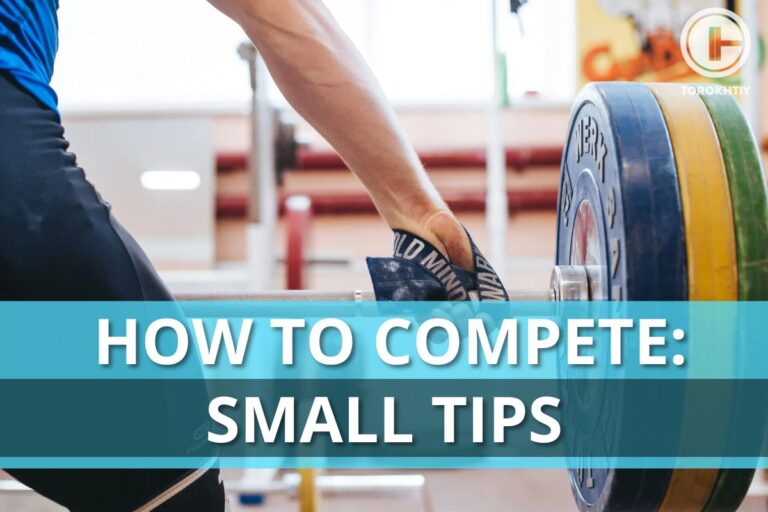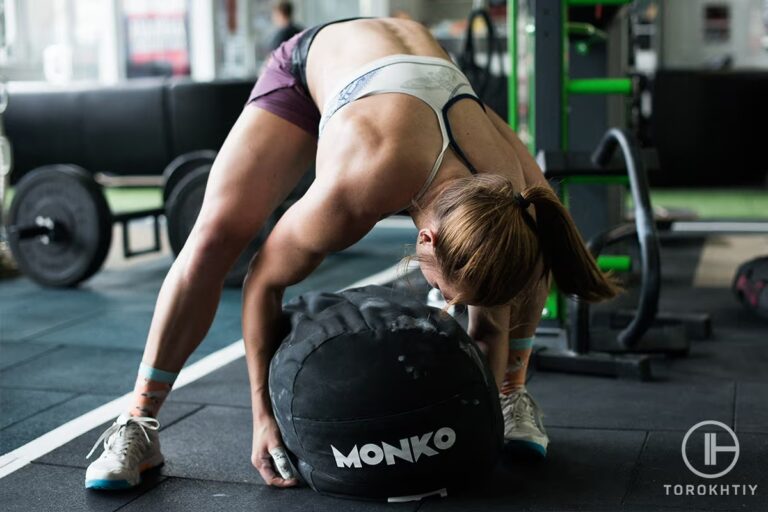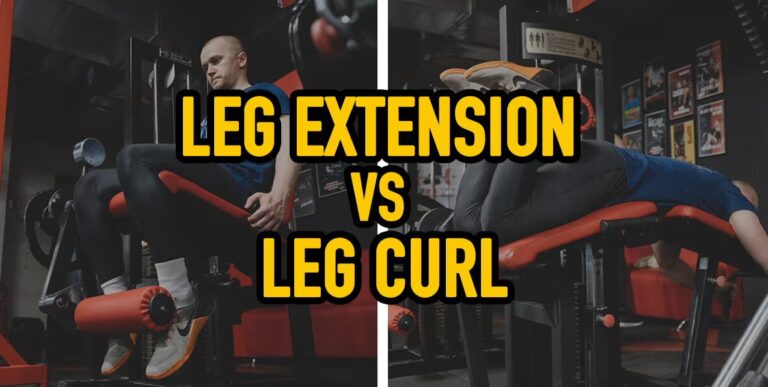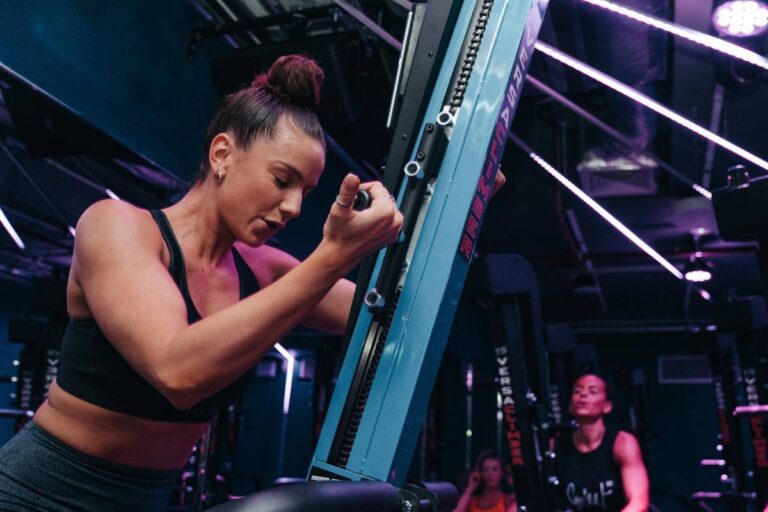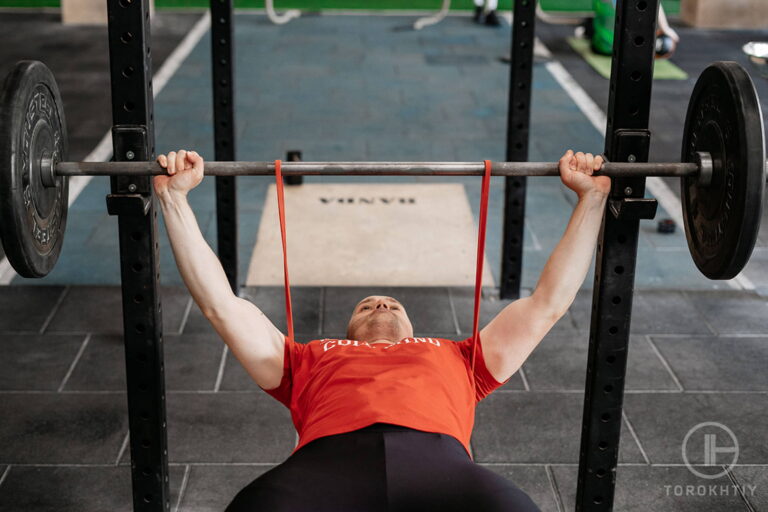6 Best Push Up Bar Exercises for Effective Workout
Sometimes while performing push-ups or similar exercises where there’s a lot of pressure on the wrists, there could be a risk of injury. Push up bar exercises eliminate this risk by keeping your wrists in a neutral position and also increasing the range of motion, thus, also making the workouts more challenging.
Push up bar exercises are great to incorporate into your fitness regimen as they add an extra layer of difficulty to the workouts while also increasing the range of motion. Because of the mentioned reasons, the exercises become way more enjoyable, and they bear great results.
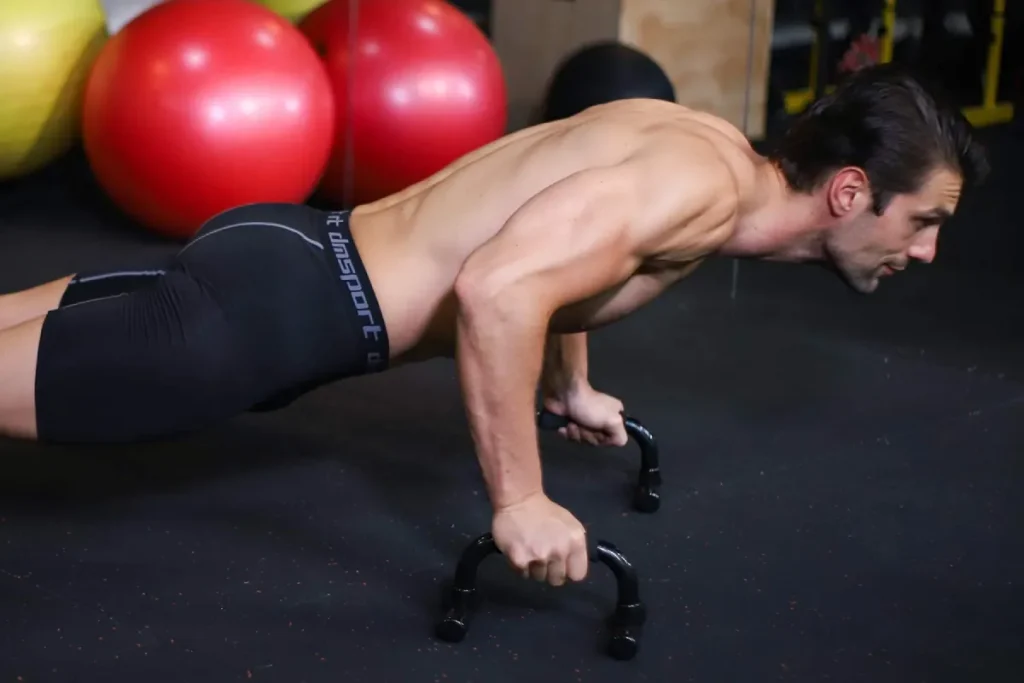
Top Push up Bar Exercises
One of the best things about having a push-up bar in your workout arsenal is the freedom of being able to perform numerous calisthenic exercises with just that one piece of equipment. Without further ado, let’s take a look at some great exercises that you can add to your push up bar workout routines.
Push-Ups
The push-up is the best exercise known to man. It builds upper body strength and core strength, and it is the single best foundational exercise we can learn and perform. Adding a push-up bar for a push-up makes it even better as you can now go deeper while going down, which provides a better contraction and, eventually, better strength and muscle gains.
This exercise will also automatically teach you how to use push up bars. All you need to do is place the push-up bars where you’d place your hand while performing a standard push-up and then grip the bar with your hands. Then, perform a push up as usual. You can also adjust the bar to perform different push-up variations, like the wide or narrow push-up.
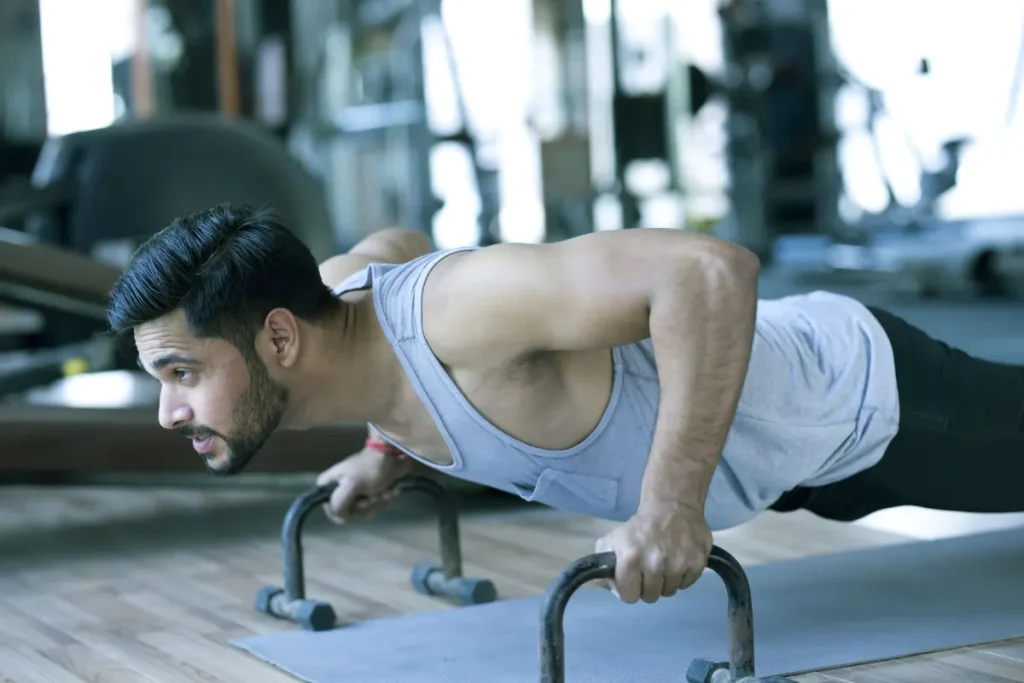
Frog Stand
This exercise is a bit more challenging than a push-up bar push-up, and it is also the foundational exercise for other skilled exercises like a handstand. It would require a lot of practice and patience from your end, but it’s all worth it in the end.
For performing a frog stand on a push-up bar, grab the bars with your hands and lean forward while taking your feet off the floor. Don’t forget to support yourself by placing your knees on your elbows. It might feel peculiar at first, but you’ll learn it when you master the balance.
As the exercise becomes easier for you, you can gradually reduce the elbow usage for supporting knees. Soon, there will come a point where you won’t feel the need to rest your knees.
Pike Push-Ups
All push-up variations can be done without a push-up bar, but having a push-up bar makes things better by adding some extra range of motion and an additional layer of difficulty. Pike push-ups are a variation of push-ups that target your shoulders.
For performing pike push-ups, keep your legs extended throughout the exercise. The closer your hands are to your feet, the tougher it will be to perform this exercise. Keep your legs extended, raise your hips, and go down as if you’re diving (head first) while performing a push-up.
L-Sits
L-sit is among the most basic calisthenic exercises that are also very beneficial if you want to strengthen and improve your calisthenic abilities. Not only does this exercise look very good, but it also works multiple muscles in your body.
To perform an L-sit, sit upright and keep both bars on either side of your shoulders on the ground. Then, grip the bar and try to lift yourself off the ground, straightening your legs as you do so. To ensure that your form isn’t distorted, protract your shoulders and completely extend your arms while you maintain that position. It might take time to learn for beginners as it requires a lot of balance.
Handstand
A handstand is perhaps the fanciest exercise you could do with a push-up bar. It is also the most fascinating exercise as it piques the interests of a lot of fitness enthusiasts who are trying to work out with a push-up bar. It is a very popular exercise that is also very difficult to master, as it requires the perfect mix of strength and balance.
Many athletes also prefer performing the handstand without the push-up bar as it seems to be a more comfortable option for them. Before performing a handstand on a push-up bar, learn to perfectly perform a handstand on a wall and then on the floor without a push-up bar. Initially, you’ll find yourself losing balance every now and then, but it’s fine.
It is best to perform this exercise under the supervision of a fitness trainer or a partner, as your workouts will be safer and more insightful in this case. It is also very important to learn the roll off after a handstand, or else getting out of it might be very difficult for you, especially if you train alone.
Once you have mastered all these things, you’ll be ready to perform a handstand without the support of a partner or a wall on a push-up bar.
Tucked Planche
This exercise from where calisthenics starts getting advanced. You’d have to know how to perform a frog stand, and it will be beneficial if you also know how to perform a handstand before you get to this one.
Anyways, this exercise is similar to performing a frog stand except for one major difference – your knees won’t be on your elbows seeking their support. This difference not only makes the exercise much more challenging, but it also puts a lot of pressure on your wrist when you perform a tucked planche.
A push-up bar is very helpful here as it creates a more neutral position for your wrist while taking off all the extra pressure that would’ve been applied without it. To make sure that you perform a perfect tucked planche, push your shoulders out and extend your arms while performing the exercise. It will create a minor hump and also ensure ideal form.
Push up Bar Workouts
Because there are so many exercises that can be performed with push-up bars, there is a lot of freedom for everybody to customize their own workout routines according to the muscles they want to target and their difficulty levels. It still makes up for a great push-up bar workout, even if you simply perform 4 sets of 10 reps of standard push-ups.
But here is a customized push up bar workout that targets various muscles.
- Standard push-ups: 45 seconds
- Wide grip push-ups: 45 seconds
- Pike push-ups: 45 seconds
- Narrow push-ups: 45 seconds
- Mountain climbers: 45 seconds
- Burpees with push-up bar (Perform the push-up on the bar and jump without the bar): 45 seconds
This workout will target all your push muscles (chest, shoulders, triceps) while also working your core and elevating your heart rate. Perform three sets of this entire circuit for best results. Similarly, you can also customize a push up bar workout according to your goals.
Push up Bar We Recommend
If you are looking to ramp up your calisthenic workouts and are looking to purchase a push-up bar, then we’d highly recommend these push-up bars from Readaeer. These have a comfortable cushion foam grip which protects the bar from slipping from your hands while you work out.
It is very lightweight, portable, and easy to use for everybody. It only weighs 1.6 lbs, and it measures 8.7 x 5.5 x 4.7”, making it easy to carry wherever you go. The cushion foam provides long-lasting support and comfort while you work out, and it also keeps injuries at bay.
All in all, this push up bar makes for a great tool for your push up handles workout.
FAQ
Is the Push-up Bar Effective?
Push up bars are amazingly effective pieces of equipment. If you have been accustomed to performing normal push-ups, you’ll certainly feel a better contraction while using a push-up bar. Firstly, it’s because it is a variation, and secondly, it is a more difficult variation of what you usually do. Push up bars are definitely worth it.
Why Are Push up Bars Exercises Harder?
Push up bars tend to be harder for those people who usually perform normal push-ups. That is because push up bars increase the range of motion. As compared to a push up, you’ll be able to go deeper with a push-up bar, which increases the contraction, making it more difficult for you at the bottom. The harder it gets with a push up bar, the better results you’ll see.
Conclusion
So, these were the different exercises and workouts that could be performed with a push-up bar. In the beginning, it is always best to perform these exercises under an expert’s supervision. Do you have any push-up bar exercise suggestions? Let us know in the comments section.
Also read:
- Functional Fitness Games Open Equipment List
- Best Fitness Balance Board
- Best Fan for Garage Gym
- Best Gym Water Bottle
- Best Neck Harness
- Best Resistance Bands for Building Muscle
- Best Cable System for Home Gym
- Best Grip Strengthener
- Best Functional Trainer for Home Gym
References:
- 12 Calisthenics-Exercises with Push Up Bars | for Beginners, Advanced & Professionalss // Gornation: https://www.gornation.com/blogs/news/exercises-push-up-bars
Why Trust Us?
With over 20 years in Olympic Weightlifting, our team does its best to provide the audience with ultimate support and meet the needs and requirements of advanced athletes and professional lifters, as well as people who strive to open new opportunities and develop their physical capabilities with us.
By trusting the recommendations of our certified experts in coaching, nutrition, dietology, and sports training programming, as well as scientific consultants, and physiotherapists, we provide you with thorough, well-considered, and scientifically proven content. All the information given in the articles concerning workout programming, separate exercises, and athletic performance, in general, is based on verified data. We ensure that you can rely on our professionals’ pieces of advice and recommendations that can be treated as personalized ones which will benefit you and fully meet your needs.
The product testing process is described in more detail here
Author: Ihor Shymechko
Pro Olympic Weightlifter, Coach
Best Results: Snatch – 208 kg,
C&J – 240 kg
Ihor has been a professional weightlifter since 1996, boasting over two decades of competition experience. His notable achievements include clinching the European Championship in 2009 and securing a silver medal in the 105kg division at the Senior World Championships in 2011. Ihor represented his country in the 2008, 2012, and 2016 Summer Olympics. After retiring from competitive weightlifting, he transitioned to coaching, leveraging his vast experience to guide athletes who now compete on both national and international stages.

